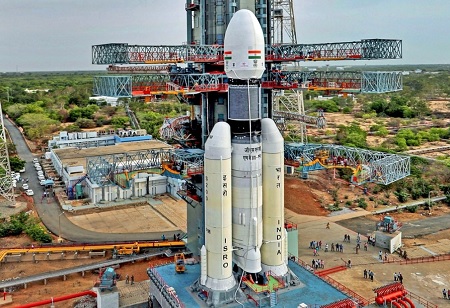
ISRO to Privatize LVM3 Rocket Manufacturing

 In a recent development, ISRO convened a stakeholder conference to evaluate the potential engagement of the private sector in the production of its robust launch vehicle, the LVM3. Having a history of collaboration with the private industry since its inception on August 15, 1969, ISRO is now exploring the delegation of the manufacturing process to private entities. This strategic move aims to enhance ISRO's responsiveness to a growing demand for its services.
In a recent development, ISRO convened a stakeholder conference to evaluate the potential engagement of the private sector in the production of its robust launch vehicle, the LVM3. Having a history of collaboration with the private industry since its inception on August 15, 1969, ISRO is now exploring the delegation of the manufacturing process to private entities. This strategic move aims to enhance ISRO's responsiveness to a growing demand for its services.
New Space India Limited (NSIL), the private subsidiary of ISRO, has collaborated with ISRO to host a stakeholder conference with the objective of manufacturing India's largest and most powerful rocket, the Launch Vehicle Mark 3 (LVM3), through a highly successful public-private partnership (PPP) model. Under this partnership, ISRO will share risks and investments, encouraging the industry to produce an increased number of LVM3s over an extended period. The conference, held in Bengaluru on January 16, 2024, saw the participation of representatives from 30 companies, totaling over 70 attendees. Recognizing an unmet demand in the international launch services market, ISRO aims to address this gap.
The current configurations of LVM3 can transport up to four tonnes to Geosynchronous Transfer Orbit (GTO) and eight tonnes to Low Earth Orbit (LEO). This initiative aligns with the space reforms introduced by the Government of India in 2020. ISRO plans to empower private industries for the end-to-end manufacturing of launch vehicles, exemplified by a pilot program involving Hindustan Aeronautics Limited (HAL) and Larsen & Toubro forming a consortium that successfully realized five Polar Satellite Launch Vehicles (PSLV). This strategic move allows private partners to transition from being subsystem suppliers or vendors to becoming system integrators.
To secure a larger share of commercial launches in the rapidly growing market and maintain competitiveness, ISRO recognizes the need to increase launch frequency. This requires an ample supply of rockets, and a projection for the next decade anticipates significant demand for launching communication satellites to Geostationary Transfer Orbit (GTO) and for satellite mega-constellations to Low Earth Orbit (LEO). In its efforts to foster potential partnerships with private industries in India for the production of Launch Vehicle Mark 3 (LVM3), ISRO has engaged the assistance of IIFCL Projects Limited, a wholly-owned subsidiary of the Indian Infrastructure Finance Company Limited (IIFCL), a Government of India enterprise.